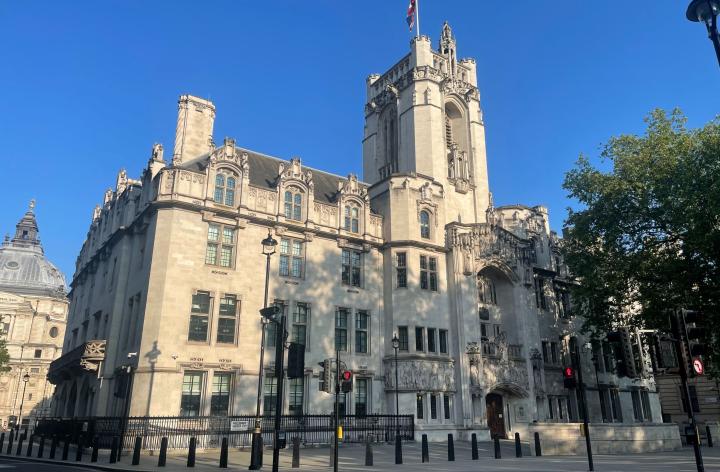Last month, the UK Supreme Court held a two-day hearing on the question of whether the Scottish Parliament has the power to legislate for an independence referendum without the consent of the UK Government.

While the hearing was only the "tip of the iceberg" as described by Lord Reed, with over 8,000 pages of arguments and supporting documents to consider, it set out the key legal issues the court will have to consider.
There are two limbs to the case before the court:
(1) Does the Supreme Court have jurisdiction to determine the Lord Advocate's reference? In any event, should the Court decline to determine the reference as a matter of its inherent discretion?
(2) The proposed Scottish Independence Referendum Bill provides that the question to be asked in a referendum would be "Should Scotland be an independent country?". Does that question relate to reserved matters? In particular, does it relate to: (i) the Union of the Kingdoms of Scotland and England; and/or (ii) the Parliament of the United Kingdom?
Legislative Background
The Scottish Parliament has the power to make laws for Scotland under s. 28 (1) of the Scotland Act 1998. However, a provision of an Act of Scottish Parliament is not law if the provision is outside the legislative competence of the Scottish Parliament, as set out in s. 29 (1) Scotland Act 1998. This is addressed in s. 29 (2) (b) Scotland Act 1998, which provides that a provision is outside legislative competence if it relates to reserved matters. Whether a provision relates to a reserved matter is determined "by reference to the purpose of the provision, having regard (among other things) to its effect in all the circumstances" (s. 29 (3) Scotland Act 1998). Reserved matters are listed in Schedule 5 of the Act and include matters that address "the Union of the Kingdoms of Scotland and England" and "the Parliament of the United Kingdom" (paras 1(b) and (c) Schedule 5 Scotland Act 1998).
The Scotland Act allows the Lord Advocate to refer to the Supreme Court any devolution issue which is not already the subject of proceedings. A devolution issue includes "any other question arising by virtue of this Act about reserved matters" (para 1 (f) of Schedule 6 Scotland Act 1998).
This reference concerns the draft Scottish Independence Reference Bill (the "Bill"). The Bill makes provision for a referendum on Scottish independence (clause 2 (1)). The question proposed is: "Should Scotland be an independent country?" (clause 2 (2)). The key issue in the reference is whether this provision relates to reserved matters.
The Hearing
During the hearing, counsel for the UK Government, Sir James Eadie KC, argued that the case should fall at the first hurdle, and the referral should be dismissed. He put to the court that, although it has discretion to choose whether it answers, the question to the court must always arise to address draft or current legislation. The scope of the referral mechanism in the Scotland Act 1998 was therefore narrow and limited to only certain circumstances. He argued that this case came in circumstances in which the Scottish Government had not even felt able to introduce a bill to the Scottish Parliament on the basis of competence. Therefore, Sir James suggested that the referral was premature and theoretical.
If the court chose to answer the referral, Sir James argued that the judges should reject the Scottish Government's argument that an 'advisory' referendum would not be related to the union with England. Indeed, it was argued by Sir James, that such a Bill would relate directly to the reserved matter of the Union, and therefore consent of the UK Government would be required.
For the Scottish Government, the Lord Advocate Dorothy Bain KC put to the court that the Scottish independence question was of exceptional public importance to the people of Scotland and to the people of the UK. She argued that Parliament had created the unusual mechanism for law officers to ask the court questions of competence. She argued that this was a broad power, and the legislation allowed for the Lord Advocate to ask the question of whether a matter was reserved where it was unclear. It was argued that it was not a question of what previous law officers would have done in these circumstances, or even what future law officers may do, but it is what she, as the current Lord Advocate, has authority to do under the Scotland Act 1998.
The Lord Advocate put to the court that the Bill would not relate to the reserved matter of the Union because the referendum would only be consultative. Although a referendum would have significant political consequences, she argued that it would not be legally binding on the UK Government, and would not in itself end the Union.
What next?
At the end of the hearing, the Supreme Court noted that it would take months before its judgment is published. The judges will consider the arguments presented at the hearing, along with the thousands of supporting documents submitted before the court.
In the meantime, whilst the Scottish Government set out their proposed plans for an independent Scotland, many will be waiting to see what the judgment may mean for the constitutional future of the UK.
The content of this webpage is for information only and is not intended to be construed as legal advice and should not be treated as a substitute for specific advice. Morton Fraser LLP accepts no responsibility for the content of any third party website to which this webpage refers. Morton Fraser LLP is authorised and regulated by the Financial Conduct Authority.










